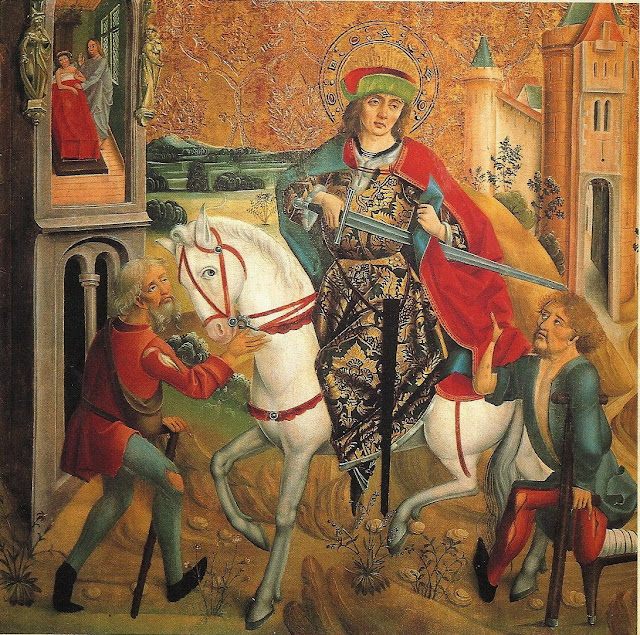Martinmas
Ah,
Martinmas, one of our great unsung holidays!
But
wait, you say, this is Veterans Day. Don’t you love ’Murrica? Yes, yes, of
course I do, my good man. Unfortunately we are rarely taught why Veterans Day
(nee Armistice Day) falls on the particular date that it does.
It
all goes back to this wonderful little fellow serving in the Roman Legions during the Fourth Century A.D. Martin by name, he was sent to help garrison
Gaul because the French are always stirring up some sort of trouble. Seeing a
winter storm rolling in, Martin headed for the nearest town to take shelter
overnight, only to encounter a naked beggar at the city gates. (I doubt this
means the full monty, but I’m sure the poor man was in naught but rags.)
Realizing that this unfortunate fellow wouldn’t survive the coming storm,
Martin took his army-issue sword and used it to slice his army-issue red cloak
in two, giving one half to the beggar.
That
night Martin dreamt of Jesus Christ standing before the angels of Heaven,
holding aloft the severed cape and proclaiming: “See how Martin the soldier has
clothed me!” When he awoke, Martin became a man of the Church and eventually
bishop of Tours. At death he was canonized a saint, the patron of
soldiers-turned-peacemakers. St. Martin’s Day, better known as Martinmas, falls
on November 11th, and is still widely celebrated as a harvest festival in parts
of Europe. Children light paper lanterns to remind us of how the Light of
Christ’s peace dispels the darkness of war.
Fast
forward 16 centuries or so to the Great War (A.D. 1914-1918), when Europe began
phase one of her collective suicide. As the war ground to its bitter end, the
countries involved made sure to sign their peace treaty in the eleventh hour of
the eleventh day of the eleventh month. Why? Because 100 years ago everyone in
Europe knew the story of St. Martin and the significance of Martinmas, the
celebration of soldiers-turned-peacemakers. Thus did November 11th become
Armistice Day and later Veterans Day.
Some
interesting side notes: Martin’s half-cape (capella) became an important relic
for French kings, who carried it in their entourage whilst traveling their
domain. Each night the capella (chapelle in French) would be housed in a little shrine along the
way—hence the term “chapel”. Furthermore, the retinue would sing without the
benefit of musical instruments, as they were after all on the move, and this
sort of unaccompanied vocal music was known as the style “from the chapel,” or a cappella. Lutherans also recall that on
November 10th, A.D. 1483, Hans and Margaret Luther gave birth to a bouncing
baby boy, whom they brought to be christened the very next day. Given that
November 11th was Martinmas, he became Martin Luther.
And
did I mention that it’s my anniversary as well?


Comments
Post a Comment